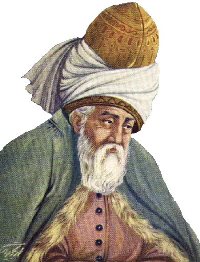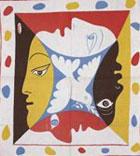In a move barely noticed in the West, more than three years ago, Iran's Grand Ayatollah Rohani issued a formal legal ruling—a fatwa—declaring that the use of entheogens and psychedelics was permissible (ḥalāl) for Shi'a Muslims for purposes of treatment and spiritual growth.

Poet and Mystic, Jalaludin Rumi
Grand Ayatollah Rohani's fatwa specified that such use should be undertaken under the direction and supervision of qualified experts, but it did not specify which psychoactive substances were meant to be included. The fatwa, however, was delivered after long discussions with petitioners about the effects of DMT, ayahuasca, haoma (or soma), LSD, psilocybin mushrooms, ibogaine, and marijuana.
Sufi mystic, Islamic scholar and psychedelic practitioner Wahid Azal explained what happened in an interview with Reality Sandwich. Another Shi'i scholar approached him about opening a dialog with the Shi'i religious establishment in an effort to get some sort of formal legal opinion about the approach to the therapeutic and spiritual use of entheogens:
To make a long story short, after well over a year and a half of back and forth discussions and correspondences between my friend (and one other individual) with the office of Grand Ayatollah Sayyed Mohammad Sadeq Hussaini Rohani in Qom, Iran; in mid-March 2014, via email, the Grand Ayatollah issued a formal legal ruling (that is, a fatwa) determining the use of entheogens and psychoactive substances to be licit and thus permissible (ḥalāl) for Shi’i Muslims provided it be under the direction and supervision of qualified experts (ahl al-ikhtiṣāṣ), and that, moreover, such plant substances as a rule do not impair the mind. In the final missive before the decision, the questioner specifically underscored the issue of the visionary component of these plants, where people have reported visions of paradise and hell, and Grand Ayatollah Rohani’s fatwa finds no objections here either.Grand Ayatollah Rohani could have been open to mind-altering drugs because the psychedelics have a resemblance to Esfand, also known as Syrian rue (peganum harmala), which contains the psychoactive indole alkaloid harmaline, a central nervous system stimulant and MAO inhibitor used for thousands of years in the region. According to at least one Shi'i tradition, the Prophet Mohammed took esfand for 50 days.
Whatever the precise theological reasoning behind the Rohani's fatwa, with it, Iran could leapfrog Western nations when it comes to psychedelic research. Although psychedelics are seeing a research renaissance in the West, research here is limited by their criminalized legal status, as well as lack of funding. But the Islamic Republic has cleared the way.
Copyright applies.
https://www.alternet.org/drugs/believe-middle-east-theocracy-enlightened-entheogens-psychedelics-iran
